Recently, my appetite for travelling has brought me closer to one of the most intrinsic community of our country i.e. Muslim or Islamic Community.
My earlier encounters with the community has given birth to the inquisitiveness to acquaint myself more with the notions of the community and find answers to certain question which had been swinging in my mind for a long time.
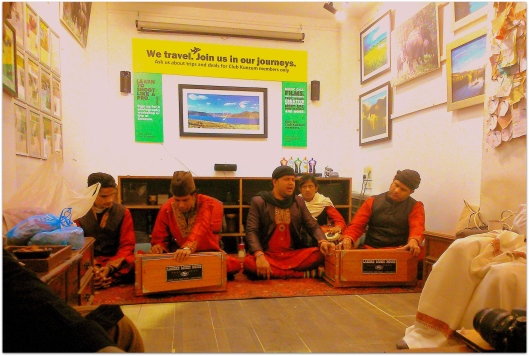
My quest for fathoming the concepts and beliefs of the community made me sign up for a “Sufi Baithak” (A discussion on Sufism) organized by “Delhi By Foot”. The “Baithak”, first of its kind, unlocked the heavenly doors of rich Sufi culture and traditions to general public (Sufi Baithaks are usually held in private family gatherings, festivals, and parties in Muslim community) which have evolved over the span of several centuries.
Although, it was a small gathering, but from where I perceive it, it’s a start of new beginning of something good. The Baithak was led by Syed Ajmal Nizami, who is one of the descendants of relatives of Hazrat Nizamuddin Auliya and also the caretakers of Nizamuddin Auliya’s mausoleum for centuries.
He edified the gathering on the concept of Sufism and the spiritual legacy of Hazrat Nizamuddin Auliya. He was accompanied by Qawalls trained in Sufi music and who presented the unadulterated version of Qawaalis before the audience in between the discussions.
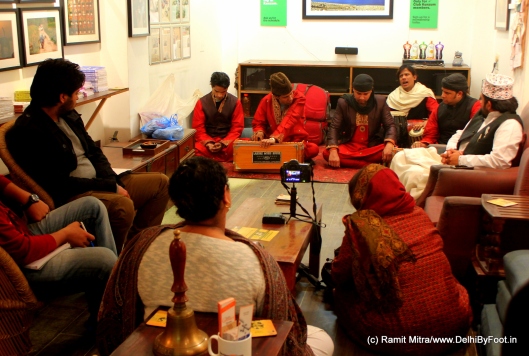
Syed Ajmal initiated the Baithak with a beautiful shayari:
“Ye na dekho ki log chand hai, Ye dekho ki irada nek hai”
(If the purpose is virtuous, it doesn’t matter even if there are few followers)
He then started off with the splendid history of Sufism dating back to 1000 years in time. The concept started off in present day Baghdad where such Sufi Baithaks were organized and the attendees were served different sharbatsaccording to their age. However, when Chengez Khan invaded the region, he destroyed and plundered everything that came in its way and gradually the Indian Sub-Continent Region became the epicentre of Sufism. He then articulated the story of Hazrat Nizamuddin Auliya and how he turned into the face of Sufism in the world.
Syed Ajmal narrated some beautiful anecdotes from the life of Hazrat Nizamuddin Auliya and Hazrat Amir Khurso, his favourite disciple who is attributed for creating numerous couplets in Arabic, Persian, Awadhi, khadi boliand invention of musical instruments Sitar and Tabla and various Taranas (a composition of classical vocal music in which certain words based on Arabic and Persian phonemes are rendered at medium, fast or pace). Hazrat Amir Khusro is also accredited for creating countless Qawaalis in the service of almighty and his master Nizamuddin Auliya.
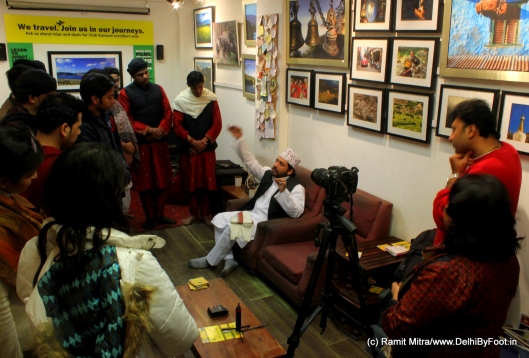
The Baithak then progressed to the concept of Sufism and the genesis of the word “Sufi”. Syed Ajmal enunciated number of origins of the word “Sufi” among which I absorbed one to my heart. It is said that the word “Sufi” originated from the Arabic word “Safa” which means purity and clarity. Thus, “Sufi” means a person whose heart is pure and clear from all the materialistic adulterations and the one who respects everyone. I strongly believe that the other origins explained by Syed Ajmal also conveyed more or less the same meaning.
Upon hearing the above definition or origin of the word Sufi, it felt that what it aimed to convey resembled to the teachings embodied in the manuscripts of Hindu religion (which I have been following).
The only difference lies in the nomenclature. It made me comprehend that every religion in its original unadulterated form is secular and only aims to serve humanity. It does not makes any distinction among its beneficiaries and treat every human being equal irrespective of their religions.
It is very clear from life and teaching of Sufi Saints or Hindu Saints who never made distinction among people on the basis of religion. It is only the when the minds get infected with impurities, a feeling of hatred and intolerance arises among the masses which leads to the unfortunate events which multiplies it further.
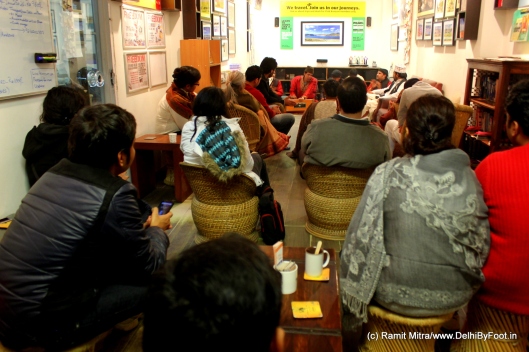
In between the discussions swaying between Sufism, anecdotes, couplets, the evening was bestowed with heart-warming Qawallis from the Qawalls (Sufi Singers) who had practiced the Sufi music in its sheer and non-commercial form from a tender age.
Even though the Qawallis were in different languages including Arabic, Persian, Punjabi, Urdu and many times I could not understand their meaning, but Syed Ajmal and the accompanying Qawalls graciously elaborated their meaning to the gathering. The beautiful Qawallis touched the hearts of everyone present as music has no language and boundaries. I believe the language of music does not lies in its words but it floats in the air through its rhythm which can be imbibed by every listener.
The Qawallis filled the venue with all together a different aura and energy which can only be embraced by heart and cannot be described in words. The small acts of respect for their ancestors by Qawalls by holding their ears whenever their name came during Qawallis or the discussions made it look even better.
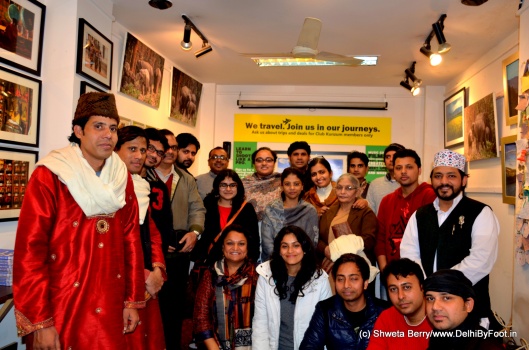
After several rounds of discussion and elegant Qawallis, the Baithak or mehfil (as they call in Urdu) finally culminated with the famous Qawalli “Damadam Mastkalander….” and some Kashmiri Kawa along with another delight- Sheermal(a sort of mild sweet bread) which according Syed Ajmal has been an integral part of such Sufi gatherings.
The Baithak was certainly an eye opener for people like me who have very little knowledge about vibrant Sufi culture and traditions.

Kaushal Mathpal is an Advocate practicing in Delhi Courts in India but also has a flair for travelling. When he’s not in a courtroom, he enjoys exploring various parts of India and the surrounding region. He also writes on his blog http://rediscoveryourdreams.wordpress.com/ and you can follow him on Twitter @KaushalMathpal.








